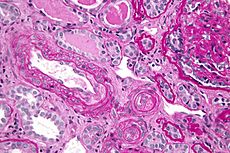- Malignant hypertension
-
Malignant hypertension Classification and external resources 
Micrograph showing thrombotic microangiopathy, a histomorphologic finding seen in malignant hypertension. Kidney biopsy. PAS stain.ICD-10 I10 ICD-9 401.0[1] DiseasesDB 7788 eMedicine med/1107 MeSH D006974 Malignant hypertension is a complication of hypertension characterized by very elevated blood pressure, and organ damage in the eyes, brain, heart and/or kidneys. It is considered a hypertensive emergency.
The eyes may show retinal hemorrhage, or exudate. A diagnosis of malignant hypertension must show papilledema.
The brain shows manifestations of increased intracranial pressure, such as headache, vomiting, subarachnoid, and cerebral hemorrhage.
Patients will usually suffer from left ventricular dysfunction.
The kidneys will be affected, resulting in hematuria, proteinuria, and acute renal failure.
It differs from other complications of hypertension in that it is accompanied by papilledema.[2] This can be associated with hypertensive retinopathy.
Systolic and diastolic blood pressures are usually greater than 200mmHg and 140mmHg, respectively.
References
- ^ MedaPhase: Newsletter
- ^ "malignant hypertension" at Dorland's Medical Dictionary
- Hypertension, Malignant at emedicine.com
See also
- Hypertensive emergency
- Hypertensive encephalopathy
Cardiovascular disease: vascular disease · Circulatory system pathology (I70–I99, 440–456) Arteries, arterioles
and capillariesAtherosclerosis (Foam cell, Fatty streak, Atheroma, Intermittent claudication) · Monckeberg's arteriosclerosis · Arteriolosclerosis (Hyaline, Hyperplastic, oxycholesterol, cholesterol, LDL, trans fat)Othertorso: Aortic aneurysm (Thoracic aortic aneurysm, Abdominal aortic aneurysm) · Aortic dissection · Coronary artery aneurysmhead/neck: Cerebral aneurysm · Intracranial berry aneurysm · Carotid artery dissection · Vertebral artery dissection · Familial aortic dissectionVeins OtherArteries or veins Blood pressure Hypertensive heart disease · Hypertensive nephropathy · Essential hypertension · Secondary hypertension (Renovascular hypertension) · Pulmonary hypertension · Malignant hypertension · Benign hypertension · Systolic hypertension · White coat hypertensionCategories:- Medical emergencies
- Intensive care medicine
- Hypertension
- Medicine stubs
Wikimedia Foundation. 2010.
